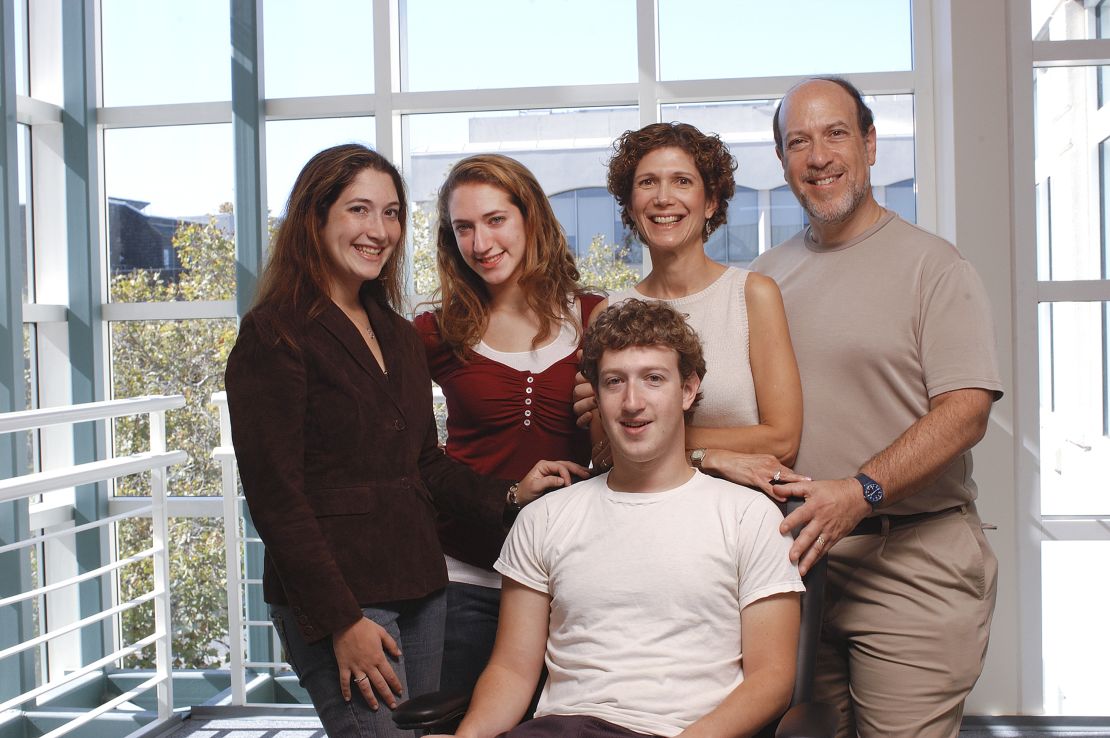Tune in to “Facebook at 15: It’s Complicated,” airing on CNN at 9:00 p.m. on Sunday February 10.
The internet would be a very different place if Mark Zuckerberg had taken his father’s offer to forgo college.
Before Zuckerberg started at Harvard University, where he famously launched Facebook (FB) in his dorm room 15 years ago, his father gave him and his three sisters an alternative to school: open up a McDonald’s franchise.
“My dad, funny enough, right before each of us went to college offered us the options of going to college or like investing in a franchise and running it,” his sister Randi Zuckerberg said in a recent interview with CNN Business’ Laurie Segall.
Featured in CNN’s forthcoming documentary “Facebook at 15: It’s Complicated” airing February 10, Randi Zuckerberg discussed what it was like for the siblings growing up in Dobbs Ferry, New York, about 22 miles north of New York City.
While she said her parents had mixed feelings about Mark Zuckerberg dropping out of college, they supported all their children’s decisions.
“I think they were like ‘Okay, you probably should have taken the McDonald’s franchise money if you wanted a business. But, okay, this might be a second good choice,’” Randi Zuckerberg said.
Of course, Facebook now has 2.32 billion monthly users around the world, and brought in $16.9 billion in revenue during its most recent quarter. Mark Zuckerberg is worth an estimated $65.3 billion.
Randi Zuckerberg, who was an early employee at Facebook and headed up early live video efforts on the platform, is now the CEO of Zuckerberg Media, her own production company. Its portfolio includes a TV show for children about a tech-savvy girl named Dot, a pop-up experience for kids called Sue’s Tech Kitchen and a Sirius XM Business Radio show about the latest technology trends.
But before starting her own company, she left a job at a major advertising agency to join Facebook. She recalled flying to California for the first time ever to meet with the small Facebook team working out of a house in the suburbs and advising them on a new logo.
Those were simpler days. Now Facebook is grappling with foreign election meddling, privacy scandals and the spread of misinformation on its platform.
Facebook Live, a feature that launched worldwide in 2016 and allows anyone to post a live video from their phone, has had its share of unexpected issues, too. In addition to livestreaming concerts and cooking meals, users have broadcast suicides, violent attacks and murders.
“I think we’re very young and idealistic at that time that we’re creating these … I remember thinking, ‘Oh my gosh, we have given a voice to everyone,’ and just waking up and feeling so excited about that,” said Randi Zuckerberg, recalling Facebook’s early livestream efforts. “It really wasn’t until years later, with a lot that I see going on in the world, that I woke up and was like, ‘Oh my gosh, we’ve given a voice to everyone.’”

She added that the tools were created with “such incredible intentions” to democratize media and content, and put the power into its users’ hands.
“Of course what we realized is that any time that you put a tool out into the world, there’s going to be people that use it for incredible good, and there’s going to be people that really use it for incredible bad,” Randi Zuckerberg said.
She said the problem is that the tech world is so “now, now, now” that it can miss the big picture.
“We are putting so much pressure on young people to create multi-billion dollar companies that of course, how could they have time to think about the future implications of what they’re building,” she said. “I think [Facebook] builds things with great intentions, and because of shareholder obligations, [it] didn’t have the time to sit and think, ‘Wait, these tools that we’re building, what could happen with them?’”
She said she’s worried now about how tech could “change the world not really for us, but for our children and their children.” And she’s been critical of big tech in other ways, too, advocating for more diversity in Silicon Valley, especially gender diversity.
But Randi Zuckerberg does frequently come to her brother’s defense.
Last year, his comments about why Facebook did not remove posts from Holocaust deniers, who he said aren’t “intentionally getting it wrong,” drew wide criticism. At the time, she said her brother “could have chosen his words differently,” but she applauded him for “navigating this incredibly difficult new world where the notion of free speech is constantly changing.”
The two siblings support each other in other ways, too. Mark Zuckerberg once cut out of a meeting with President Obama early to see his sister’s debut on Broadway.
But it’s been years since the two snuck into each other’s rooms at night to play Mario Kart on Super Nintendo and schemed up family pranks. Randi Zuckerberg’s favorite: cutting the circuit breaker at midnight on New Year’s Eve in 1999. Their mother, who was nervous about Y2K – a bug that threatened to shut down computers worldwide once it became the year 2000 – began screaming, “Y2K is happening!”
“[It was] so mean, but so awesome,” Randi Zuckerberg said. “We were super grounded for a really long time. It was worth it.”
Although she calls their relationship close, she believes their family dynamics may have inspired Facebook’s mission of connecting with others.
“When you have such a big family, you kind of have all of your companions built into your family unit,” Randi Zuckerberg said. “Maybe after just spending his entire childhood growing up with three sisters, he’s like, I just got to connect with other people.”

























